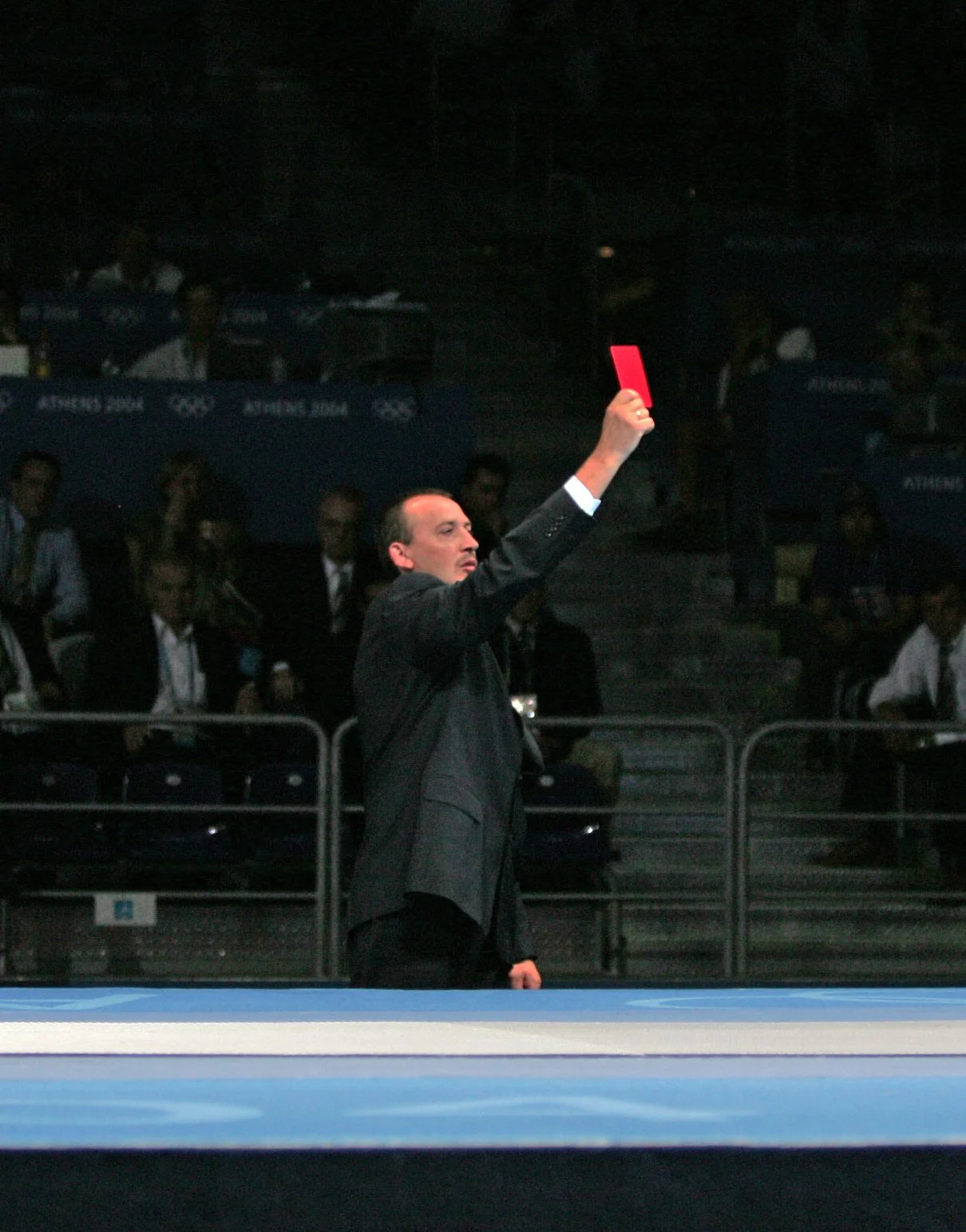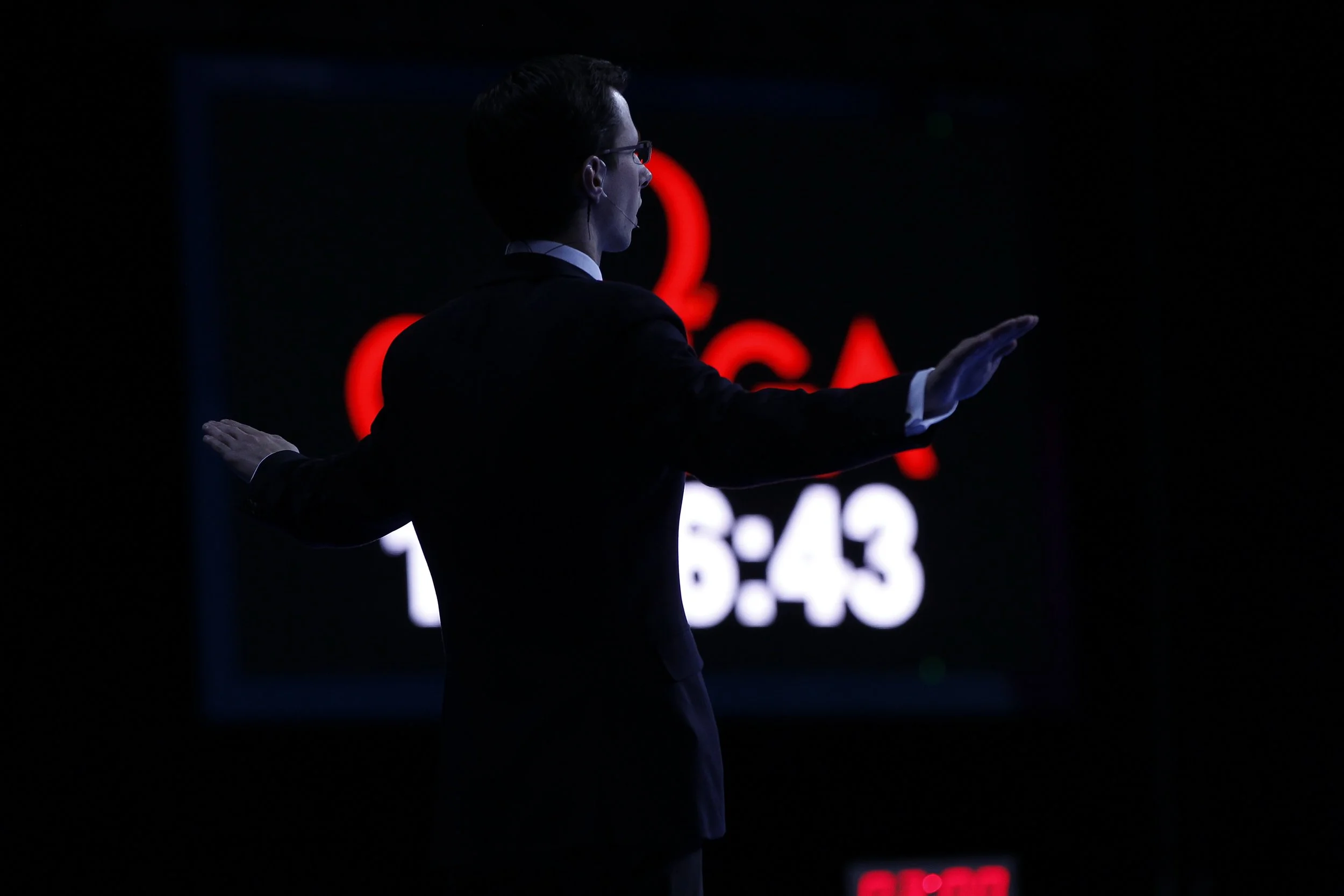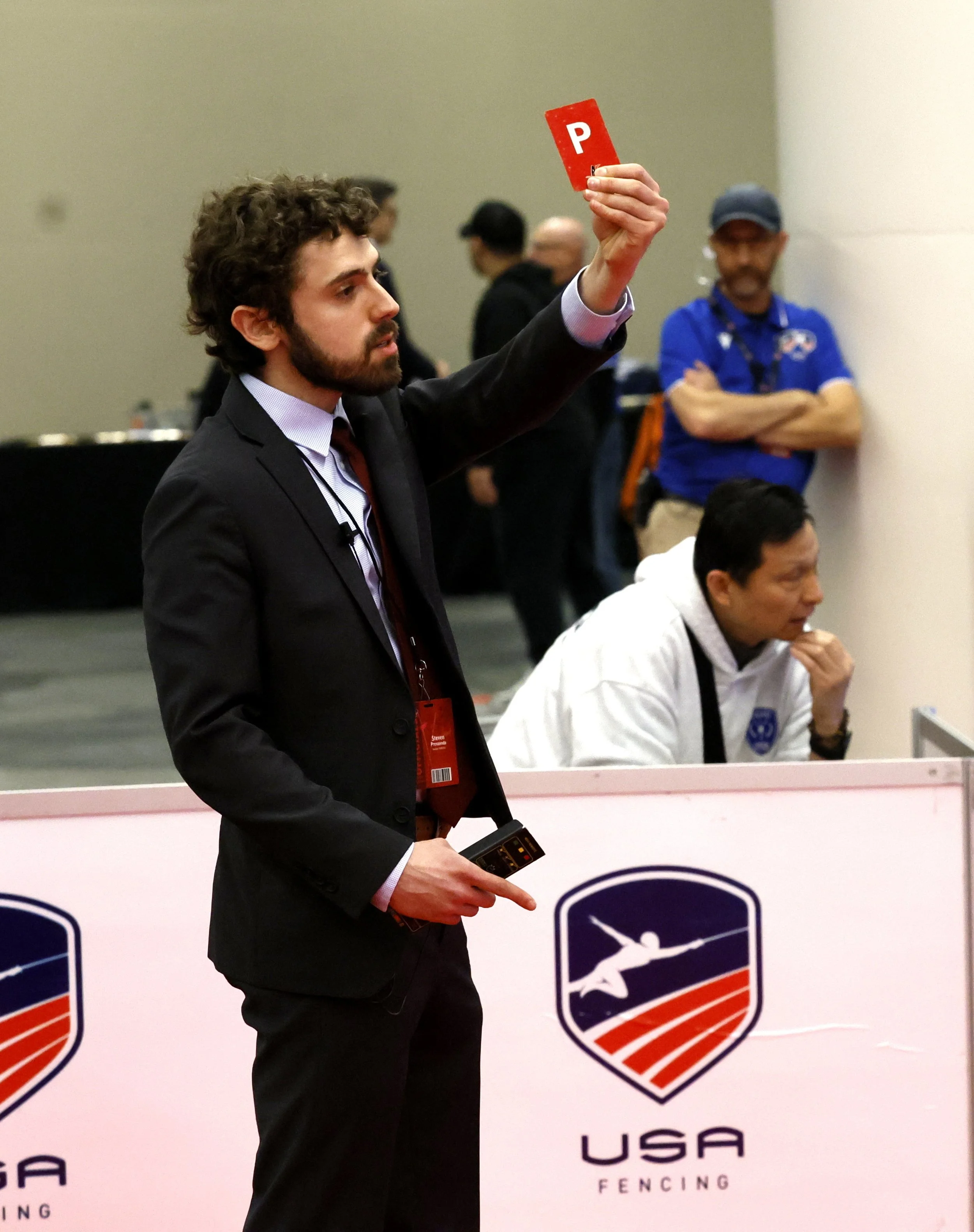The No-Win Life of the Referee
My late father, Dan, a USA Fencing Hall of Famer, not only competed in four Olympics, but refereed in five more. He instilled in me from my teens that refereeing is a thankless job. A half a century of refereeing later, I have the battle scars to prove it.
A referee walks into the venue each day as perfect and often leaves being called incompetent or unscrupulous, or both, in multiple languages.
As my Dad told me, “The life of the referee is like an ever-decreasing concentric circle until there is nobody left who loves you, as everyone remembers the one call you made that hurt them.”
From personal experience on both sides of the equation, I can assure you he was correct.
U.S. Olympian Dan Bukantz competed in four Olympic Games and refereed in five. Photo courtesy of Jeff Bukantz
As a fencer, I will always remember the one call that eliminated me from contention for the 1984 Olympic Team. Back in those days, the beat/counter-beat action was called inconsistently. Some refs called the beat, and others gave it to the attempted parry or counter-beat. That call was akin to the Forrest Gump box of chocolates, as you never knew what you were going to get.
At that time, the late George Kolombatovich was one of the foil stalwarts and a referee with whom I felt comfortable and often requested. Unfortunately, on that fateful day, he called my crystal-clear beat four attack as parried by 1984 Olympian Michael McCahey. And while that one call alone didn’t keep me off the team, it was the proverbial nail in the coffin that I will remember for the rest of my life.
That was four decades ago, and it feels like it happened yesterday. Kolombatovich was a very good referee, but that one call proved my dad’s theory.
As a referee I encountered an identical situation.
On July 22 at the 1996 Atlanta Olympics, I refereed the men’s semifinal between the eventual gold-medalist Alessandro Puccino of Italy and Franck Boidin of France. It was a daunting moment, as my entire career would be defined by my performance in this bout. One or two bad mistakes and the reputation I had earned would be gone.
What made it even more daunting was being in front of 4,000 spectators at the Georgia World Congress Center, a worldwide television audience and having to speak French, which was not my native language.
There was another wrinkle, as replays would be shown on two gigantic video screens on each side of the strip. The replays were for the spectators, but not for review. I had to discipline myself not to look at the replays to see if I made a mistake; but it would not have mattered, because if I made a mistake, the fans would have let me hear it.
Thankfully, I got through the bout unscathed.
Athens 2004. Photo: Serge Timacheff/2004
The then-president of the FIE Arbitrage (Referees) Commission, the late FIE and USA Fencing Hall of Famer Chaba Pallaghy, told me, “Bukantz, you are now considered to be one of the best referees in the world. Congratulations, my son.”
I relate this story not for purposes of self-aggrandizement but rather to illustrate how right my dad was.
Fast-forward eight years later, when I was USA Team Captain in Athens 2004.
I ran into Boidin for the first time since Atlanta. I went up to introduce myself and without a blink he said, “Of course I remember you. You did a great job in Atlanta, but you made one very bad mistake against me.”
As my Dad said, everyone remembers the one call they think you blew in an important bout!
I would be remiss if I didn’t mention one more glaring example of the hypothesis:
I refereed at the NCAAs from 1978 until 2010, the last six years as head referee. In 2003, the gold medal bout in men’s foil was between Penn State’s Nontapat Panchan and St. John’s Nitai Kfir. Panchan eventually won 15-14, but I still hear about my call for Panchan at 13-12 from my dear friend and St. John’s longtime coach (and USA Fencing Hall of Famer and 7-time Olympic coach) Yury Gelman.
While “attack no,” was not yet in vogue, that is exactly what happened. Kfir attacked all the way down the strip but Panchan pulled distance and made him fall short before making his new attack and making the score 14-12.
London 2012. Serge Timacheff/2012
For the last 22 years, Yury has given me grief over this call. Almost a quarter of a century, for crying out loud! But I know the call was correct, and my opinion is not alone. After all, when I ran into Panchan at the Shanghai Grand Prix last year, he assured me the call was correct!!
All joking aside, Danny Bukantz’s theory that everyone remembers the one call is on the money.The job is thankless, and unconditional compliments are few and far between. Unless a referee is also a synchronized swimmer, it is not a good idea to hold one’s breath waiting for a compliment.
In my fifty years of refereeing, here are the three I can remember, although they were anything but, ahem, unconditional.
Compliment #1. At one NCAA regionals, I had just finished the final pool when fellow referee Nadya Nazarova came up to me. “Jeff, that was the best refereeing I have ever seen. You were like a maestro conducting a symphony.”
Now, as this most definitely was not my first rodeo, I knew something was up. Sure enough, I looked at the scoresheet and saw that Nadya’s son Alexandr had gone undefeated, lol.
Compliment #2. During my heyday, Penn State was one of the powerhouses, winning many NCAAs. I refereed most of their big dual meets and crucial NCAA bouts for a generation. They say familiarity breeds contempt. Let us just say the contempt-o-meter was off the charts.
Penn State’s legendary coach and USA Fencing Hall of Famer, the late Emik Kaidanov, never once said thank you, good job or anything bordering on nice to me. Emik worked me incessantly and never gave an inch. Off the strip we got along swimmingly. On the strip it was omnipresent tension and conflict.
One time, in an attempt to insult me, Kaidanov, finally and uncharacteristically let his guard down. He said with a sneer, “You know, you’re not as good as you used to be.”
2025 Cleveland NAC. Serge Timacheff/2025
My eyes lit up, and his sneer was met with my Cheshire cat grin, as I knew I had him. “Emik, thank you, that’s the nicest compliment you have ever given me.” Knowing that I got him, my friend Emik’s sneer was replaced by a smile, as well.
Compliment #3. But undoubtedly the best compliment I ever received happened at the 2001 NCAAs. Felix Reichling of Stanford was the two-time defending men’s foil champion but placed third here.
He was walking around the gym with a scowl and a sour puss face. I went up to him and said, “Felix, with two golds and a bronze, you go down in history as one of the greatest men’s foil fencers in NCAA history.”
Reichling snapped back in his thick German accent, “The refereeing here vas awful. You vere da least awful.”
And there you have it. A half a century of high-level refereeing and two of the most memorable “compliments” were that I wasn’t as good as I used to be, and that I was the least awful!
Seriously, referees can’t take themselves so seriously. It is a tough business. We can’t win a bout, but we can be accused of causing someone to lose a bout. Sometimes with good reason, and that comes with the turf.
My philosophy has been to take solace in the fact that, as a referee, I have done my best to keep the playing field level and provide the fencers with the best possible competitive environment.
At the end of the day, you hope the fencers, coaches and parents appreciate the efforts.
And, as far as being the least awful, I’ll take it!




